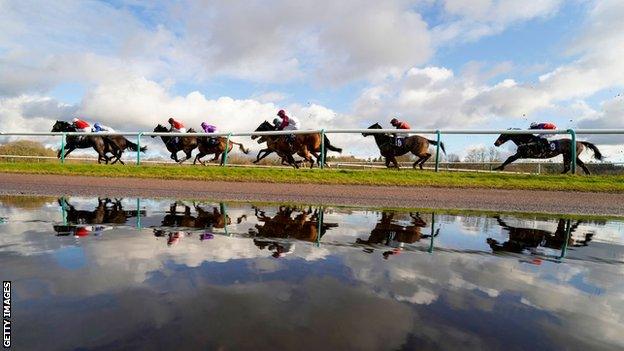Horse racing starts saliva-based testing pilot to screen jockeys for cocaine
- Published

Horse racing has been taking place behind closed doors because of the coronavirus pandemic
Horse racing has started a two-month pilot of using saliva tests to screen jockeys for cocaine and other banned substances.
Jockeys have been tested at race meetings at Lingfield and Kempton so far this week, with all samples coming back negative.
The Professional Jockeys Association (PJA) said the development of a method that can detect cocaine in a jockey's system almost instantly - and therefore mean they can be stood down from racing - is "tremendously important".
Previously, jockeys were tested using blood, urine and hair sampling.
The British Horseracing Authority (BHA) also told BBC Sport that it expects the penalties for jockeys who test positive for banned substances to be increased.
There has been an increase in the number of positive urine samples in recent years, with six in 2019 and five in 2020, after no more than three positives in a single year between 2012 and 2018.
The BHA's chief regulatory officer, Brant Dunshea, said they were "obviously concerned" by the rise in cases.
Last month, 42-year-old jockey Adrian McCarthy was banned for six months after he was 1,000 times over the cocaine limit when riding at Chelmsford in October 2020.
Champion flat jockey Oisin Murphy recently returned after a three-month ban for testing positive for cocaine last summer in France, though he denies ever taking the Class A drug.
Dunshea said the pilot was a "progressive step" and has partly come after concerns were raised by jockeys about the safety of racing against others who might be under the influence of a banned substance.
"By increasing what we do, jockeys will know that the likelihood of them being caught doing the wrong thing will increase," he said.
"By increasing the frequency in which we sample and being able to turn them around very quickly means we'll be in a position to be able to ensure that jockeys who may have done the wrong thing aren't riding on that particular day, rather than retrospectively analysing a sample and finding out about it several days later.
"We hope that that will lead to jockeys thinking more carefully about their decision-making in the event that they may be tempted to do the wrong thing."
He said jockeys were "fully behind" the pilot, which has been launched in collaboration with the PJA.
If it is successful, Dunshea anticipates that using saliva testing would enable the BHA to increase its testing capacity by 50%, as it is more cost-effective than urine sampling, while another benefit is that it is less invasive for jockeys.
The penalty framework is also being reviewed, in a bid to make sure that the strongest deterrent is being provided.
"The likelihood is that we would seek to increase the penalty and ensure that there is a range there for disciplinary panels to consider based on the individual circumstances of each case," Dunshea said.
"But yes, I would expect that we would see an increase in the penalty."

Dreaming Whilst Black: Why Kwabena's dream job might mean risking it all
Castro vs the World: Fidel Castro's Cuba as told by the spies, revolutionaries and diplomats who shaped it
